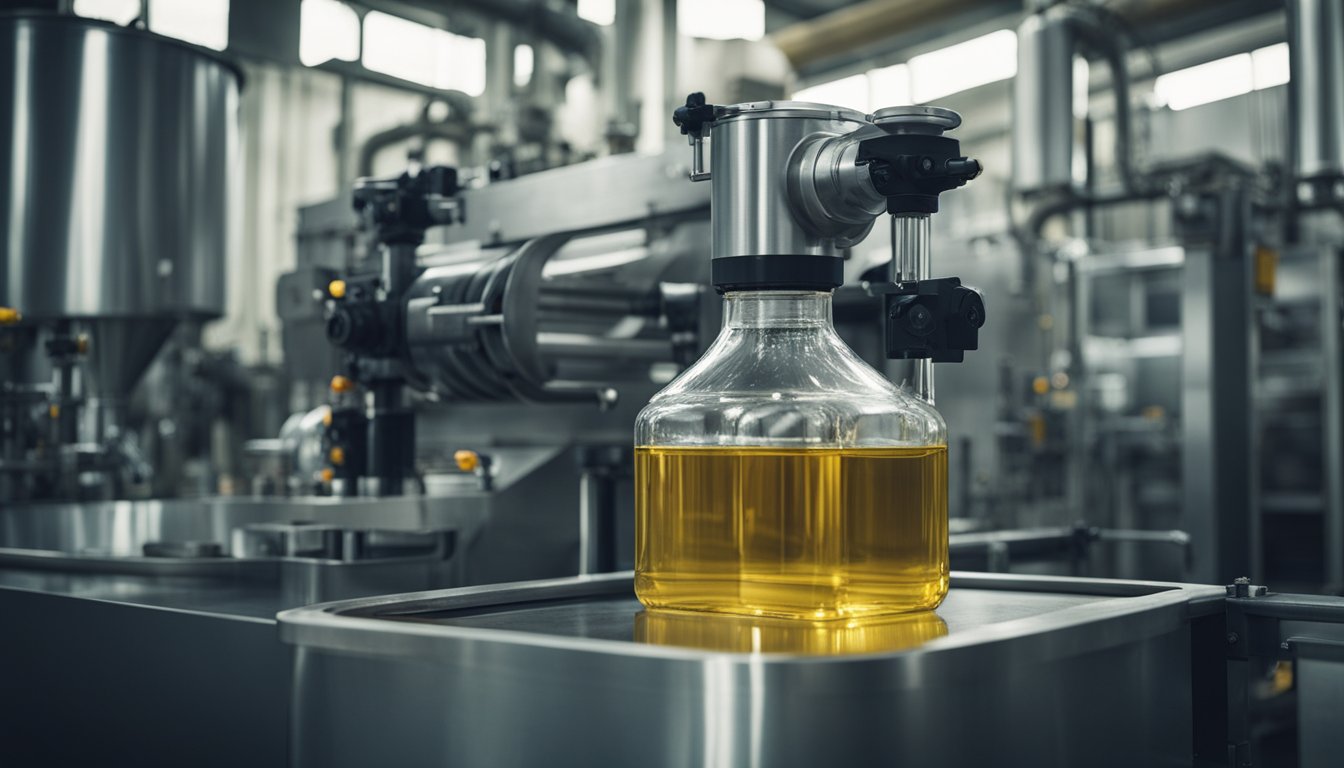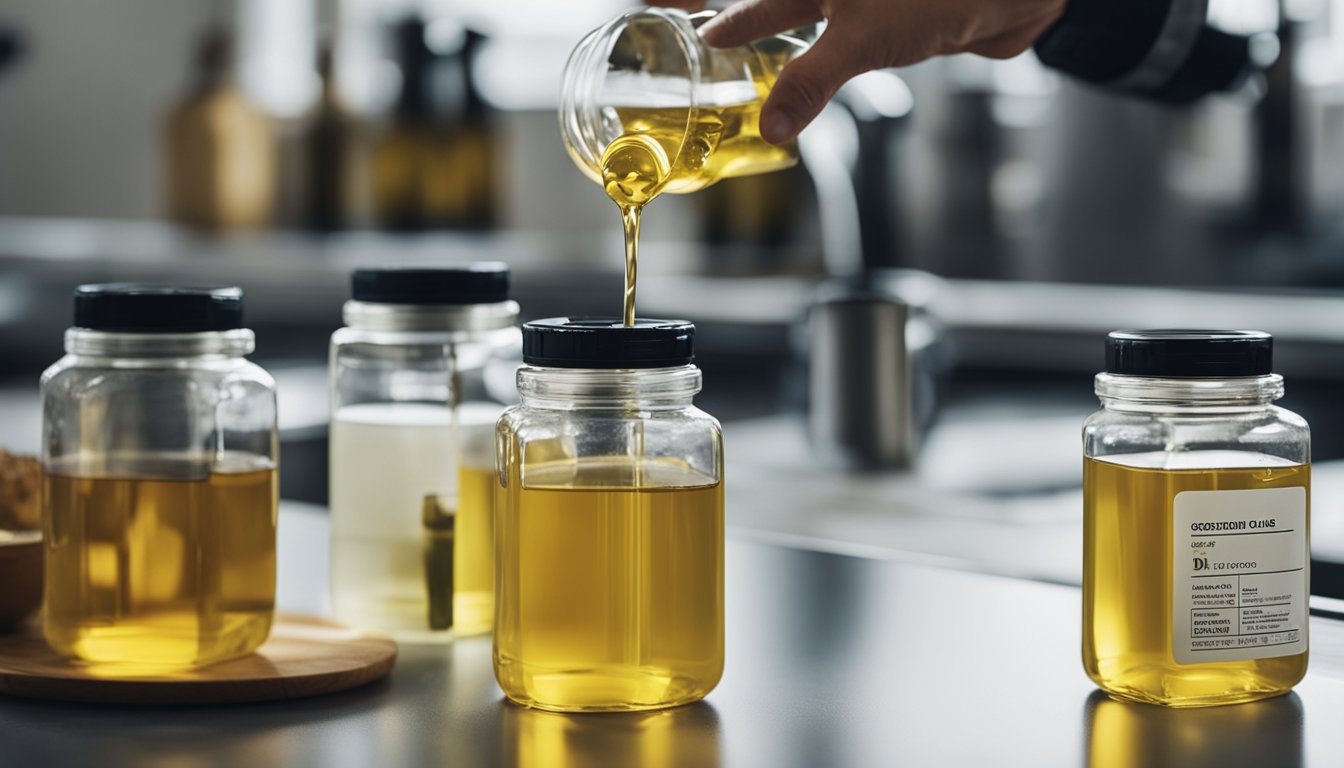Late updated: 18 Jan 2025 10:01
Written by: Sarah Hollister
Sustainable Strategies For Reducing Cooking Oil Waste: Effective Approaches for Eco-Friendly Kitchens
Waste cooking oil is an often-overlooked culprit in our kitchens that contributes significantly to environmental issues. Recycling and reusing used cooking oil is a practical step in reducing waste and promoting sustainability. By adopting such strategies, we not only minimise our ecological footprint but also support the transition towards a circular economy.

Every drop of cooking oil has potential beyond the frying pan. When repurposed correctly, it can be transformed into valuable resources like biodiesel, providing an eco-friendly alternative to traditional fossil fuels. Managing used cooking oil sustainably allows us to contribute to energy conservation and reduce reliance on non-renewable resources.
Incorporating cooking oil recycling into our daily routines requires a collective effort, but the rewards are far-reaching. By innovating and embracing these practices, we have the opportunity to enhance both environmental health and sustainable resource management.
Key Takeaways
- Recycling cooking oil supports sustainability.
- Used cooking oil can be converted into biodiesel.
- Proper oil management helps reduce environmental impact.
Sustainable Management of Used Cooking Oil (UCO)
Effective management of used cooking oil emphasises environmental sustainability by reducing waste and transforming by-products into renewable energy sources. Addressing improper disposal practices is crucial, alongside developing innovative collection methods and adhering to regulatory standards.
Environmental Benefits of UCO Recycling
Recycling used cooking oil offers significant environmental gains. By diverting waste from landfills, we lower greenhouse gas emissions and promote a circular economy. When repurposed into biodiesel or other renewable fuels, UCOs provide an eco-friendly alternative to fossil fuels. This not only reduces our carbon footprint but also enhances environmental stewardship. Furthermore, the use of UCOs for fuel production aids in conserving natural resources, showcasing a commitment to sustainability.
Current Practices in Cooking Oil Disposal
Current disposal methods for used cooking oil vary in their effectiveness. The food industry often partners with waste management companies for collection and recycling. However, improper disposal, like pouring UCOs down the drain, leads to clogging and environmental harm. Many communities encourage community engagement through awareness programmes about sustainable practices, but challenges remain. Encouraging responsible disposal methods is essential for protecting local ecosystems and water sources from contamination.
Innovations in UCO Collection and Processing
Recent advancements in UCO collection and processing aim to optimise sustainability and efficiency. Companies like Mahoney Environmental have developed novel systems to streamline collection from diverse sources, including restaurants and homes. Advanced filtration technologies remove impurities, enabling high-quality biodiesel production. Emerging AI technologies support waste management by predicting collection needs and reducing inefficiencies. Emphasising community engagement helps integrate these systems into everyday practices, further enhancing UCO recycling efforts.
Regulatory Framework and Environmental Responsibility
Regulations around UCO management are pivotal in ensuring environmental responsibility. Many regions now have strict guidelines for cooking oil disposal to prevent environmental damage. These frameworks encourage the growth of a responsible recycling industry, promoting best practices across the food sector. Compliance with these regulations not only avoids penalties but also demonstrates a commitment to environmental sustainability. As regulations evolve, they increasingly reflect the importance of sustainable practices in achieving environmental goals.
Conversion of Cooking Oil Waste to Renewable Fuels

The transformation of waste cooking oil into renewable fuels presents a valuable method for reducing environmental footprints and meeting energy demands. Key methods include biodiesel production, which mitigates reliance on fossil fuels, and sustainable practices that benefit the ecosystem.
Biodiesel Production Through Transesterification
Biodiesel production is a crucial process in converting waste cooking oil to renewable energy. The primary technique employed is transesterification, which involves reacting the used oil with an alcohol, typically methanol, in the presence of a catalyst such as potassium hydroxide.
This reaction outputs fatty acid methyl esters (FAME), commonly known as biodiesel, and glycerol as a by-product. Biodiesel thus produced can be used in most diesel engines with minor modifications. This process not only helps in waste reduction but also provides an environmentally friendly energy alternative to conventional fossil fuels.
Impact on Energy Demand and Fossil Fuels
By converting waste cooking oil into renewable fuels, we can significantly impact our energy demand. Utilising such biofuels reduces dependency on traditional fossil fuels, which are both non-renewable and harmful to the environment.
The adoption of biodiesel helps lower greenhouse gas emissions, making transportation and industrial sectors more sustainable. As the energy landscape shifts, these innovations provide a feasible solution to meet demands while preserving natural resources. Moreover, the process presents economic benefits by lowering the costs associated with waste disposal and fossil fuel consumption.
Eco-friendly Solutions and Sustainable Practices
Adopting sustainable practices is paramount in the conversion of waste cooking oils to renewable fuels. Efficient collection and processing of used oils from restaurants and homes are essential steps.
We must establish proper systems for oil collection and storage, preventing contamination and facilitating smoother processing. Implementing these eco-friendly solutions not only reduces food waste but also strengthens our commitment to sustainable energy production. As we advance these practices, it's vital to integrate technologies that lower energy consumption in fuel production, thereby maximising the potential of cooking oil waste as a renewable resource.
Frequently Asked Questions

Exploring sustainable strategies for managing cooking oil waste involves understanding best practices for disposal, recycling options, and alternative methods to prevent environmental harm. Let's address some common queries in this area.
What are the best practices for disposing of used cooking oil without harming the environment?
Used cooking oil should never be poured down the sink as it can cause blockages and environmental damage. Instead, cool the oil and store it in a sealed container. Take it to a local recycling facility or arrange for a collection service specialising in environmentally friendly disposal.
In which ways can cooking oil be recycled and what are the local options available for this?
Cooking oil can be recycled into biodiesel, used as raw material for various products, or transformed into eco-friendly soaps. Many communities offer recycling programmes and collection points. Check with local waste management services to find specific options available nearby, which help in reducing reliance on virgin oils.
How can one sustainably manage the disposal of large quantities of cooking oil used in food service?
For businesses dealing with substantial amounts of cooking oil, partnering with a professional waste management service is essential. These services not only ensure safe disposal but can convert used oil into renewable energy sources. Regularly scheduled pickups can streamline operations and support sustainable practices.
Are there any effective methods to reduce the amount of waste produced by cooking oil?
Reducing cooking oil waste starts with optimising its usage. Use high-efficiency frying equipment to extend oil life, and regularly filter oil to remove food particles. Training kitchen staff on efficient oil usage and disposal is also beneficial. By employing these methods, businesses can minimise waste and cut costs.
What alternatives exist to discarding cooking oil in the kitchen sink that would prevent plumbing issues?
Instead of pouring oil down the sink, which can lead to plumbing complications, consider reusing it when possible. If the oil is still clean, it might be suitable for additional frying or as a base for salad dressings. Otherwise, store it for recycling or composting under the right conditions.
Can cooking oil be composted, and if so, under what conditions is this method most effective?
Cooking oil can be composted in small quantities. It should be mixed well with carbon-rich materials like sawdust or leaves to balance the compost pile. It's important to avoid adding too much oil, as it can inhibit the composting process and attract pests. Composting works best in a managed and well-maintained setting.
